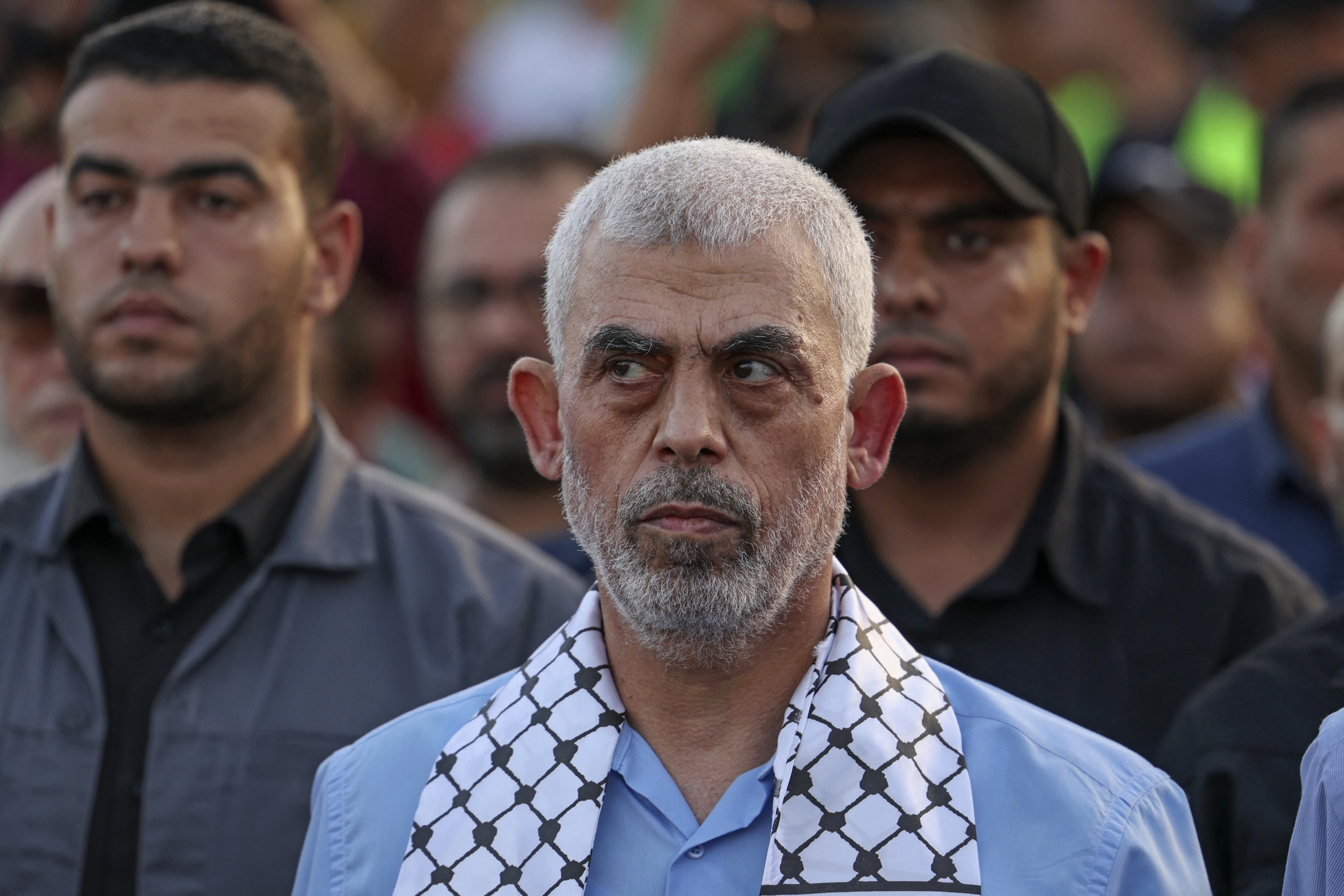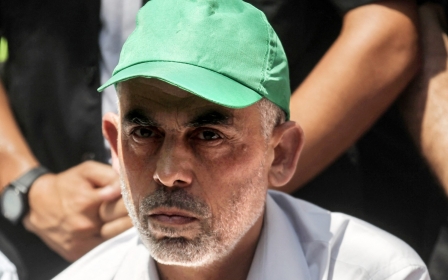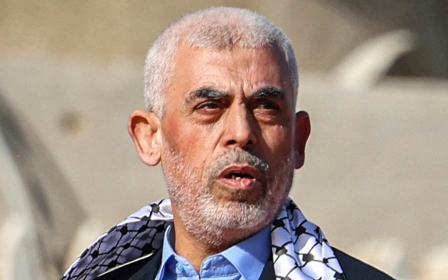'Resistance never dies': Social media reacts to killing of Yahya Sinwar

Yahya Sinwar, the leader of Hamas and one of Israel’s most wanted figures, was killed during an Israeli military operation in Gaza on Wednesday, the Israeli military said.
The Palestinian movement confirmed his death on Friday.
Following the announcement of Sinwar's killing, social media exploded with a mix of sympathy, mourning, admiration and criticism. The hashtag #Sinwar went viral on X, formerly Twitter, with over two million shares as users discussed his legacy and his final moments.
Thousands of people also shared drone footage released by the Israeli military appearing to show Sinwar's final moments.
The video shows what appears to be an injured Sinwar in military fatigues, with an amputated arm, throwing a piece of debris towards the drone camera, which many users praised as "a last act of defiance" and as symbolic of his dedication to the Palestinian cause.
New MEE newsletter: Jerusalem Dispatch
Sign up to get the latest insights and analysis on Israel-Palestine, alongside Turkey Unpacked and other MEE newsletters
Hamas is proscribed as a terrorist organisation in the UK, US and European Union. Sinwar is widely ascribed as the architect of the 7 October Hamas-led attacks on southern Israel, in which more than 1100 people were killed and around 250 taken captive by Palestinian fighters.
"He died an honorable death. A warrior's death, among his men, one with his people, in defense of his land against a genocidal intruder, occupier, and colonizer," one user wrote.
"The last episode of Sinwar's life could not have been better written by the most gifted playwright: not in a tunnel, a secret bunker, or a far-off palace, and not while engaging in some unworthy act. He died resisting," they continued.
"[H]e threw a stick at the drone filming him – a final act of defiance... In his death, he became a legend," commented an X user in a post that gained over 27,000 reshares at the time of publication.
Israel made the mistake of publishing footage of Yahya Sinwar's last moments.
— Dan Cohen (@dancohen3000) October 17, 2024
Wearing a kufiyyeh and severely injured, he threw a stick at the drone filming him – a final act of defiance against the Zionist occupation.
In his death, he became a legend. pic.twitter.com/bHEpPSY9TD
Others echoed these sentiments, or praised him as a martyr.
"Yahya Sinwar will replace Che for the next millenium. After this video, even those who disagree with him will respect his courage and resilience," wrote another user, referring to the Argentinian-Cuban revolutionary who was killed leading an uprising in Bolivia in 1967, and became a leftist icon.
Israel accidentally turned Yahya Al Sinwar into an international hero. The man became a legend
— Hadi (@HadiNasrallah) October 17, 2024
Several users also stated that the footage appeared to contradict the Israeli army's and western officials' narratives that the movement's leader was hiding in tunnels with Israeli hostages nearby as human shields.
"I wanna congratulate the Israeli government for detailing the play by play of Sinwar’s death. Showing that he fought alongside his men, wasn’t hiding in a bunker... This isn’t the win you think it is, ding-dongs," said one user.
Another said: "Dropping the video of Sinwar with an amputated arm fighting to his last breath is such a self own. I’ve never seen a leader with more courage and steadfastness making more of a sacrifice for their people. What a giant."
Not sure why @IDF chose to release this. For those who want to glorify #Sinwar as a resistance hero, it shows him fighting to the last having lost an arm, on the front lines w/ his fighters rather than hiding in a tunnel behind human shields which has been the IDF's narrative.… https://t.co/ObFuWcFrjM
— Leila Molana-Allen (@Leila_MA) October 17, 2024
Several others drew attention to the history of Israel's attacks on Palestinians and the fact that Israeli Prime Minister Benjamin Netanyahu and other Israeli leaders stated immediately following Sinwar's death that the war in Gaza would continue.
"Let us not forget: it hasn't been about Sinwar or Hamas, and never about October 7th or the hostages. It is about a 80-year history of ethnic cleansing and land grabbing," wrote one user.
Rima Hassan, a French-Palestinian jurist, human rights activist and politician, tweeted: "Sinwar was born in a Palestinian refugee camp in 1962, which still exists today," highlighting the continued displacement of Palestinians since 1948.
Many users, including some based in Gaza, said that the killing of Sinwar would not stop Palestinians from resisting Israeli occupation.
We will all walk the path of resistance and the path of Sinwar. If they kill Sinwar today, a hundred Sinwars will emerge to take his place.
— Omar from Gaza 𓂆 (@OmarHamadD) October 17, 2024
If Israel thinks that by killing Yahya Sinwar it will stop the Palestinians from defending their land, it is mistaken. Israel has killed… pic.twitter.com/JNjLLW7Ib4
"If Israel thinks that by killing Yahya Sinwar it will stop the Palestinians from defending their land, it is mistaken," one user said.
However, not all reactions were in praise. Many pro-Israeli activists and western commentators celebrated his death.
"Just love this meltdown, keep them coming," said one user.
Others praised it as the "most important achievement" of the Israeli army since the start of the war.
Some also condemned Sinwar for his role in the 7 October attacks.
French journalist Laurence Ferrari referred on CNews to Sinwar as the "face of terrorism" responsible for "the massacre of 1,200 men, women, and children," sparking further controversy online.
🚨 «Sinouar, c'est le visage du terrorisme.!»@LaurenceFerrari se donne le droit de donner un visage au terrorisme.
— Xavier LEGRAND (@sayiandivin) October 17, 2024
Signalement @Arcom_fr pic.twitter.com/debBjTwb8b
[Translation:"🚨 'Sinwar is the face of terrorism!' @LaurenceFerrari takes it upon herself to give terrorism a face. Report @Arcom_fr"]
Born in Khan Younis refugee camp in 1962, Sinwar rose to prominence in Hamas ranks.
He was a leading figure behind the 2018 "Great March of Return" peaceful protests, where thousands of Palestinians demanded an end to the siege on Gaza and the right of return for refugees. The protests were brutally fired on by Israeli forces, with more than 230 people killed and thousands injured.
After the Israeli assassination of then-Hamas political chief Ismail Haniyeh in July, Sinwar was chosen as successor.
He was considered Israel's main target in Gaza, and his killing was praised by US President Joe Biden as a "moment of justice" and "an opportunity to seek a path to peace".
Middle East Eye delivers independent and unrivalled coverage and analysis of the Middle East, North Africa and beyond. To learn more about republishing this content and the associated fees, please fill out this form. More about MEE can be found here.




